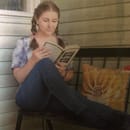Robert Frost is one of America’s most beloved poets. You probably would recognize his most famous and widely misinterpreted poem, The Road Not Taken. I am currently taking a class in which we are reading a lot of his poetry. I realized that he tends to have lines in his poetry that really should stand on their own without the context given in the poems. The following is a collection of a few of those lines:
“We love the things we love for what they are.” –Hyla Brook
This is a short, bittersweet poem about a brook that dried up and caused all the hyla frogs to go away. This line closes the poem, and it stands out from the rest of the piece. It is lovely, and I think it’s better on its own.
“And he learned of finalities besides the grave.” –The Impulse
This own comes from a poem about two married people falling out of love. This line sums up how the speaker of the poem learned that ‘til death do us part’ isn’t always true. I love this line because there really are so many finalities in life besides the grave. Sometimes you just know that something has ended. It is a sad statement, but if it’s on its own it can almost be hopeful. Every ending is just a new beginning.
“Something there is that doesn’t love a wall, that wants it down” –Mending Wall
I highly recommend that you read this poem. Of all the poems on this list, this one has the most compelling and important message. I like this line the most because the speaker is talking about himself. He hates the wall between his yard and his neighbor’s yard because it divides them. However, once a year the wall brings them together as they gather to fix the wall after the winter frost has caused it to crumble. I like this line on its own because it reminds me of our current political state. I think that Mending Wall in general connects with our country’s dialogue in many ways.
“Ah, when to the heart of man was it ever less than a treason to go with the drift of things, to yield with a grace to reason, and bow and accept the end of a love or a season?” –Reluctance
Robert Frost loves nature; that is absolutely evident from any of his poems. He also often connects that love of nature with other things. In this instance, the speaker of the poem is asking if it was “ever less than a treason” to “accept the end of a love or a season.” It’s a beautiful line in and out of the poem.
“‘Men work together,’ I told him from the heart, ‘Whether they work together or apart.’” –Tuft of Flowers
This poem follows a speaker as they see nature work together. At the end of the poem they come to this conclusion. I think it’s a wonderful conclusion to arrive to at the end of that poem or in any context. Everything that we do impacts others whether or not we intend it to.
Follow Her Campus @ Geneseo on Facebook, Twitter, Instagram, and Pinterest.



